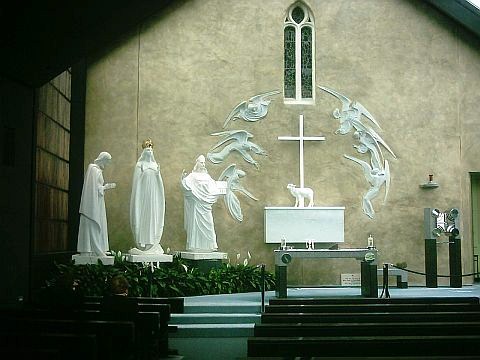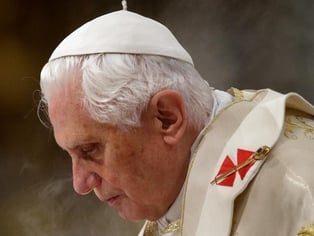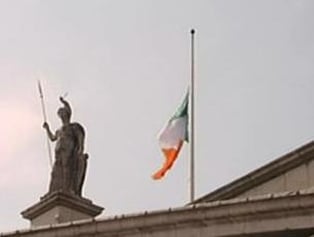
Our feast today, St John Fisher and St Thomas More seems to grow in relevance every year. After our battle for marriage these last few months their stand for the integrity of marriage and fidelity to Christ in the face of the Henry VIII's tyranny certainly resonates and shines out as a beacon of hope and encouragement.
The feast hits home more forcefully today after an experience I had this morning, one many many young priests have these days, particularly in Ireland. I had a lady on the phone ringing to buy a burial plot, she had rung the wrong parish but when she realised she was talking to me she started to rebuke me for my ministry and preaching. She believes that I am driving people away because I am preaching a Gospel she does not agree with. She wants the Church to be more like the Protestants, she said: "If the Church was more like the Anglicans and the other Protestants I would be going and so would many other people". Reality and experience show otherwise as many an Anglican minister will tell you. I told her I had to preach what Christ preached and she asked me when I was going to cop myself on and get sense. "You going to stop it, now, do you hear me? You're going to stop it!" (she actually said that).
As her recriminations grew I decided to asked her to answer one question: which was more important: to choose Christ or to give people what they wanted? She said she would go for the people; it was apparent in the conversation that, sadly, the Gospel means nothing to her. As I tried to explain what Our Lord said about that she hung up. Her attitude is not uncommon in Ireland today, particularly among people of her age group, the middle aged to elderly. Whatever has happened that generation! I could try and surmise why this lady and many like her are the way they are, but I have said it before: the Church in Ireland has failed to preach the Gospel for last half century or so, and for many Irish Catholics the faith is nothing more than a social thing, a sentimental relic useful only to make people happy or when they need a little boost. Part of me feels like concluding that it will be almost impossible to bring these people back, they are so far gone and so resistant to change, and indeed many of them, like the lady today, so bitter. But such a conclusion defies hope, and we must always hope.
The martyrs today speak of a different approach to faith. They realized that we must choose Christ, the faith is about him and the redemption he offers and the Gospel he preached. It is not about keeping people happy or giving them what they want, if it was Henry would have been able to marry and divorce at will without any moral teaching to stir his conscience. The faith is not about being popular, it is about truth, mercy and salvation and people coming to embrace all of that. Many in the Church in Ireland today live under the delusion that if we are popular (bishops and priests) we will bring people back in: but Christ's experience teaches us otherwise. In an age which rejects truth and morality, to remain popular we would have to abandon them to keep in with the people, and then we lose faith ourselves; sadly many priests in Ireland do that and they are now doing great damage as we saw with the "media priests" during the referendum.
If only Jesus had been more careful, more pastoral, turned a blind eye, say nice things to keep people in, he would never have been crucified, he would have lived a long life with lots of nice people around him listening to him and having the craic.....and none of us would have been saved. If only John Fisher had gone with the rest of the bishops of England and assented, he would have lived his last years in comfort and ease. If only Thomas More had consented, he would have had great success and honour in the kingdom, perhaps become an Earl or Marquis or even a Duke! But they didn't; they chose Christ rather than keep Henry happy because they knew what was right and what was wrong, what Christ required, and if that meant they stood alone, were attacked, faced ignominy, then so be it.
Pope Benedict wisely taught us during his pontificate that it is not numbers that matter, but fidelity to Christ. We priests and faithful should not dilute the Word of God to get people in, if we do, in the end, we will have nothing to offer and we lose everything. There may be fewer people going to Mass, but at least they want to be there, they are committed and trying to live Christ-centred lives, and we can begin working with them to reignite a new evangelisation.
Yes it is hard to see people go, and those attached to the faith may well go to other priests and parishes where the Gospel has been replaced with the doctrine of nice so their comfort is not disturbed. Yes, we may be laughed at, rebuked, told to cop ourselves on, be blamed for the collapse of the Church (it seems it is adherence to the Gospel that has led to the decline of the Church in Ireland, or so I am told). Our brother priests may look at us sadly and say we really don't get it, we are ruining it for everyone. But in the end if we cannot remain true to Christ and what he requires of us, then there is no reason to remain in the ministry we would be better off out of it for ourselves and for the Church. John Fisher and Thomas More understood that, and even though it was not the popular thing they chose Christ because that is what being Christian really means.
Fr Alexander Lucie-Smith has a good article on the two martyrs in the Catholic Herald.
Fr Alexander Lucie-Smith has a good article on the two martyrs in the Catholic Herald.









